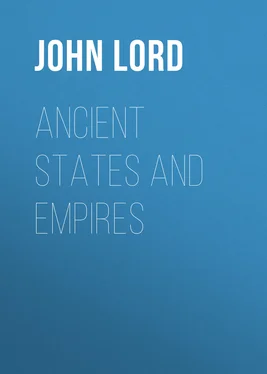John Lord - Ancient States and Empires
Здесь есть возможность читать онлайн «John Lord - Ancient States and Empires» — ознакомительный отрывок электронной книги совершенно бесплатно, а после прочтения отрывка купить полную версию. В некоторых случаях можно слушать аудио, скачать через торрент в формате fb2 и присутствует краткое содержание. Жанр: foreign_prose, История, foreign_edu, foreign_antique, на английском языке. Описание произведения, (предисловие) а так же отзывы посетителей доступны на портале библиотеки ЛибКат.
- Название:Ancient States and Empires
- Автор:
- Жанр:
- Год:неизвестен
- ISBN:нет данных
- Рейтинг книги:4 / 5. Голосов: 1
-
Избранное:Добавить в избранное
- Отзывы:
-
Ваша оценка:
- 80
- 1
- 2
- 3
- 4
- 5
Ancient States and Empires: краткое содержание, описание и аннотация
Предлагаем к чтению аннотацию, описание, краткое содержание или предисловие (зависит от того, что написал сам автор книги «Ancient States and Empires»). Если вы не нашли необходимую информацию о книге — напишите в комментариях, мы постараемся отыскать её.
Ancient States and Empires — читать онлайн ознакомительный отрывок
Ниже представлен текст книги, разбитый по страницам. Система сохранения места последней прочитанной страницы, позволяет с удобством читать онлайн бесплатно книгу «Ancient States and Empires», без необходимости каждый раз заново искать на чём Вы остановились. Поставьте закладку, и сможете в любой момент перейти на страницу, на которой закончили чтение.
Интервал:
Закладка:
The siege.
Around the devoted city Titus erected towers which overlooked the walls, from which he discharged his destructive missiles, while the battering-rams played against the walls, where they were weakest. The first wall was soon abandoned, and five days after the second was penetrated, after a furious combat, and Titus took possession of the lower city, where most of the people lived.
The precipitous heights of Zion, the tower of Antonia and the temple still remained, and although the cause was hopeless, the Jews would hear of no terms of surrender. Titus used every means. So did Josephus, who harangued the people at a safe distance. The most obstinate fury was added to presumptuous, vain confidence, perhaps allied with utter distrust of the promises of enemies whom they had offended past forgiveness.
Famine in the city.
At length famine pressed. No grain was to be bought. The wealthy secreted their food. All kind feelings were lost in the general misery. Wives snatched the last morsel from their family and weary husbands, and children from their parents. The houses were full of dying and the dead, a heavy silence oppressed every one, yet no complaints were made. They suffered in sullen gloom, and despair. From the 14th of April to the 19th of July, A.D. 70, from one hundred thousand to five hundred thousand, according to different estimates, were buried or thrown from the walls. A measure of wheat sold for a talent, and the dunghills were raked for subsistence.
The assault of Jerusalem. The fall.
When all was ready, the assault on the places which remained commenced. On the 5th of July the fortress of Antonia was taken, and the siege of the temple was pressed. Titus made one more attempt to persuade its defenders to surrender, wishing to save the sacred edifice, but they were deaf and obstinate. They continued to fight, inch by inch, exhausted by famine, and reduced to despair. They gnawed their leathern belts, and ate their very children. On the 8th of August the wall inclosing the portico, or cloisters, was scaled. On the 10th the temple itself, a powerful fortress, fell, with all its treasures, into the hands of the victors. The soldiers gazed with admiration on the plates of gold, and the curious workmanship of the sacred vessels. All that could be destroyed by fire was burned, and all who guarded the precincts were killed.
The siege and sack of the city.
Still the palace and the upper city held out. Titus promised to spare the lives of the defenders if they would instantly surrender. But they still demanded terms. Titus, in a fury, swore that the whole surviving population should be exterminated. It was not till the 7th of September that this last bulwark was captured, so obstinately did the starving Jews defend themselves. A miscellaneous slaughter commenced, till the Romans were weary of their work of vengeance. During the whole siege one million one hundred thousand were killed, and ninety-seven thousand made prisoners, since a large part of the population of Judea had taken refuge within the walls. During the whole war one million three hundred and fifty-six thousand were killed.
Thus fell Jerusalem, after a siege of five months, the most desperate defense of a capital in the history of war. It fell never to rise again as a Jewish metropolis. Never had a city greater misfortunes. Never was heroism accompanied with greater fanaticism. Never was a prophecy more signally fulfilled.
Consequences of the fall of Jerusalem.
The fall of Jerusalem was succeeded by bloody combats before the whole country was finally subdued. With the final conquest the Jews were dispersed among the nations, and their nationality was at an end. Their political existence was annihilated. The capital was destroyed, the temple demolished, and the royal house extinguished, and the high priesthood buried amid the ruins of the sacred places.
With the occupation of Palestine by strangers, and the final dispersion of the Jews over all nations, who, without a country, and without friends, maintained their institutions, their religion, their name, their peculiarities, and their associations, we leave the subject—so full of mournful interest, and of impressive lessons. The student of history should see in their prosperity and misfortunes the overruling Providence vindicating his promises, and the awful majesty of eternal laws.
BOOK II.
THE GRECIAN STATES
CHAPTER XIII.
THE GEOGRAPHY OF ANCIENT GREECE AND ITS EARLY INHABITANTS
Degeneracy of the oriental states.
We have seen that the Oriental-world, so favored by nature, so rich in fields, in flocks, and fruits, failed to realize the higher destiny of man. In spite of all the advantages of nature, he was degraded by debasing superstitions, and by the degeneracy which wealth and ease produced. He was enslaved by vices and by despots. The Assyrian and Babylonian kingdom, that “head of gold,” as seen in Nebuchadnezzar's dream, became inferior to the “breast and arms of silver,” as represented by the Persian Empire, and this, in turn, became subject to the Grecian States, “the belly and the thighs of brass.” It is the nobler Hellenic race, with its original genius, its enterprise, its stern and rugged nature, strengthened by toil, and enterprise, and war, that we are now to contemplate. It is Greece—the land of song, of art, of philosophy—the land of heroes and freemen, to which we now turn our eyes—the most interesting, and the most famous of the countries of antiquity.
Boundaries of Greece.
Let us first survey that country in all its stern ruggedness and picturesque beauty. It was small compared with Assyria or Persia. Its original name was Hellas, designated by a little district of Thessaly, which lay on the southeast verge of Europe, and extended in length from the thirty-sixth to the fortieth degree of latitude. It contained, with its islands, only twenty-one thousand two hundred and ninety square miles—less than Portugal or Ireland, but its coasts exceeded the whole Pyrenean peninsula. Hellas is itself a peninsula, bounded on the north by the Cambunian and Ceraunian mountains, which separated it from Macedonia; on the east by the Ægean Sea, (Archipelago), which separated it from Asia Minor; on the south by the Cretan Sea, and on the west by the Ionian Sea.
The mountains of Greece. Between Ossa and Olympus is the famous vale of Tempe.
The northern part of this country of the Hellenes is traversed by a range of mountains, commencing at Acra Ceraunia, on the Adriatic, and tending southeast above Dodona, in Epirus, till they join the Cambunian mountains, near Mount Olympus, which run along the coast of the Ægean till they terminate in the southeastern part of Thessaly, under the names of Ossa, Pelion, and Tisæus. The great range of Pindus enters Greece at the sources of the Peneus, where it crosses the Cambunian mountains, and extends at first south, and then east to the sea, nearly inclosing Thessaly, and dividing it from the rest of Greece. After throwing out the various spurs of Othrys, Œta, and Corax, it loses itself in those famous haunts of the Muses—the heights of Parnassus and Helicon, in Phocis and Bœotia, In the southern part of Greece are the mountains which intersect the Peloponnesus in almost every part, the principal of which are Scollis, Aroanii, and Taygetus. We can not enumerate the names of all these mountains; it is enough to say that no part of Europe, except Switzerland, is so covered with mountains as Greece, some of which attain the altitude of perpetual snow. Only a small part of the country is level.
The rivers.
The rivers, again, are numerous, but more famous for associations than for navigable importance. The Peneus which empties itself into the Ægean, a little below Tempe; the Achelous, which flows into the Ionian Sea; the Alpheus, flowing into the Ionian Sea; and the Eurotas, which enters the Laconican Gulf, are among the most considerable. The lakes are numerous, but not large. The coasts are lined by bays and promontories, favorable to navigation in its infancy, and for fishing. The adjacent seas are full of islands, memorable in Grecian history, some of which are of considerable size.
Читать дальшеИнтервал:
Закладка:
Похожие книги на «Ancient States and Empires»
Представляем Вашему вниманию похожие книги на «Ancient States and Empires» списком для выбора. Мы отобрали схожую по названию и смыслу литературу в надежде предоставить читателям больше вариантов отыскать новые, интересные, ещё непрочитанные произведения.
Обсуждение, отзывы о книге «Ancient States and Empires» и просто собственные мнения читателей. Оставьте ваши комментарии, напишите, что Вы думаете о произведении, его смысле или главных героях. Укажите что конкретно понравилось, а что нет, и почему Вы так считаете.







